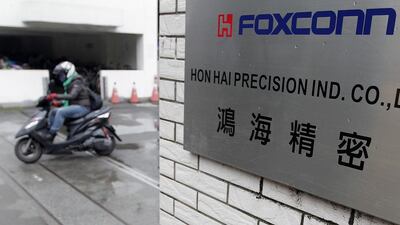Hon Hai Precision Industry, known as Foxconn and the main assembler of Apple’s iPhones, has posted its first annual revenue decline after the global smartphone market went through its worst year on record.
Foxconn saw sales fall 2.8 per cent in 2016 sales to NT$4.36 trillion (Dh501.33bn), it said in a filing to Taiwan’s stock exchange, mostly in line with analysts’ estimates. It was Foxconn’s first decline in annual revenue since listing in 1991, and comes as Terry Gou’s Foxconn Technology Group prepares to invest billions of dollars in display-making capacity after taking control of Japan’s Sharp.
The world’s biggest contract manufacturer of electronics has been grappling with the smartphone slowdown, the result of maturing markets and a decelerating Chinese economy. It has deployed robots and boosted production efficiency to drive down costs but its fate is intertwined with Apple’s, which is trying to regain investors’ confidence after less-than-stellar quarterly earnings. Pegatron, which also makes Apple products, posted a 27 per cent slide in December sales to NT$84bn.
Shares of Foxconn’s smaller rival dropped as much as 7 per cent on Wednesday to their lowest since November. Foxconn mostly unchanged.
Apple accounts for about half of its sales, according to data compiled by Bloomberg. In October, Apple reported its first annual revenue decline since 2001 and forecast sales of $76bn to $78bn for the holiday quarter. That is barely higher than expectations despite arch-rival Samsung Electronics’ issues with the now-defunct fire-prone Note 7.
Chinese rivals such as Oppo and Huawei Technologies have also steadily grown global market share at the expense of Apple and Samsung. Those brands rely on in-house manufacturing, bypassing Foxconn and Pegatron because of the perception that they pander to Apple, according to Roger Sheng, a Gartner analyst based in Shanghai.
“South Koreans are making devices on their own, and the Chinese brands think Hon Hai is too expensive and doesn’t devote the most attention to their orders,” Mr Sheng said.
* Bloomberg
business@thenational.ae
Follow The National's Business section on Twitter

